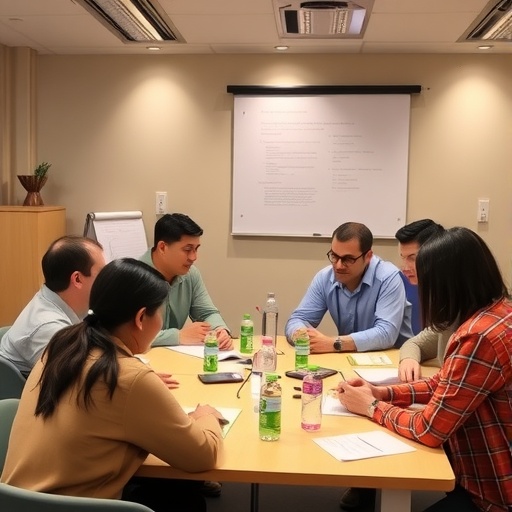In a groundbreaking study that underscores the importance of conflict resolution in medical education, researchers Zhou and colleagues have examined the efficacy of a novel conflict management workshop. This workshop, which incorporates simulated mediation techniques and mock court proceedings, represents a significant advancement in how medical professionals are trained to handle interpersonal conflicts and disputes effectively. The findings, derived from a mixed-methods approach, offer critical insights into the pedagogical benefits of incorporating hands-on strategies in medical curricula.
At the core of this research is the undeniable reality that conflicts are an inherent aspect of any professional environment, particularly within the high-stakes realm of healthcare. Medical professionals frequently face situations that are charged with emotions and differing opinions, which can lead to disputes if not managed effectively. The conflict management workshop designed by Zhou and his team sought to equip participants with the necessary skills to navigate these challenging situations with confidence and poise.
The study utilized a robust mixed-methods framework, combining quantitative data gathered from pre- and post-workshop assessments with qualitative insights drawn from participant feedback and focus group discussions. This comprehensive approach allowed the researchers to gain a nuanced understanding of the participants’ experiences and perspectives, thus enriching the overall findings. Through this method, the researchers could not only measure the skill acquisition but also explore the emotional and psychological impacts of the training.
Participants in the study included medical students and professionals who engaged in a series of role-playing exercises designed to simulate real-life conflict scenarios. These scenarios ranged from disputes between colleagues to conflicts involving patients. The workshop employed evidence-based mediation strategies that have been proven effective in resolving disputes. By immersing participants in these simulated environments, the workshop aimed to break down barriers to effective communication and foster collaborative problem-solving skills.
The results of the study were striking. Quantitative analyses indicated a significant increase in participants’ confidence levels regarding conflict management before and after the workshop. Many participants reported feeling significantly more equipped to handle disputes, citing the contextual nature of the training as particularly beneficial. This finding reflects the critical importance of experiential learning in adult education, where hands-on experience complements theoretical knowledge.
Qualitative feedback further enriched the study’s outcomes, offering valuable insights into the participants’ perceptions of the workshop. Many attendees spoke of a transformation in their understanding of conflict resolution, noting that the simulated mediation techniques helped demystify the process. The introduction of mock court proceedings added another layer of complexity, challenging participants to articulate their positions clearly and defend their decisions, thus honing their advocacy skills.
One of the most compelling aspects of the workshop was the emphasis on emotional intelligence as a foundational component of effective conflict management. Researchers highlighted the importance of empathy, active listening, and awareness of one’s own emotional responses in navigating conflicts. Participants learned to view conflicts not as purely negative occurrences but as opportunities for growth and development. This shift in mindset is pivotal in fostering a more constructive approach to conflict resolution within healthcare settings.
As the landscape of medical education continues to evolve, the incorporation of conflict management training is increasingly being recognized as essential. By understanding that interpersonal skills are just as vital as clinical competencies, educational institutions are beginning to embrace programs that develop graduates who are not only skilled practitioners but also empathetic communicators. The implications of this study suggest that conflict management should not be viewed as an ancillary skill but rather as a core competency integral to patient care and team dynamics.
Moreover, the study opens up avenues for future research in this domain. While the current findings are promising, further exploration into the long-term impacts of such workshops on professional practice could provide a deeper understanding of their effectiveness. Researchers may also consider investigating the transferability of these skills to other high-stress environments beyond healthcare, potentially benefiting a wide range of professionals faced with conflict.
In closing, Zhou and colleagues have made a laudable contribution to the field of medical education with their insightful study on conflict management. Their innovative approach to integrating realistic simulations into training programs not only aligns with contemporary educational practices but also addresses critical needs in the healthcare sector. As institutions around the globe adopt similar frameworks, the potential for improved interpersonal dynamics and enhanced patient care increases exponentially.
This pivotal research not only serves as a call to action for medical educators but also reinforces the notion that skills in conflict resolution are essential for fostering collaborative healthcare environments. In a world where effective communication and teamwork can be the difference between positive outcomes and negative ones, the workshop’s findings may very well herald a new era in how future generations of healthcare professionals are trained.
By honoring the growing recognition of interpersonal skills in medical education, the workshop exemplifies how innovative, engaging, and experiential learning methods can significantly enhance the competence and confidence of healthcare providers in real-world scenarios. As this research gains visibility, it’s likely to inspire more institutions to prioritize teaching the crucial art of conflict management.
The continued development and evaluation of such educational programs will play a vital role in shaping future healthcare providers who are better prepared to navigate the complexities of human interactions, ensuring that they can lead with compassion, understanding, and professionalism.
Subject of Research: Conflict management in medical education
Article Title: Effect of a conflict management workshop with simulated mediation and mock court proceedings: a mixed-methods study
Article References:
Zhou, YC., Tzeng, WC., Fu, CP. et al. Effect of a conflict management workshop with simulated mediation and mock court proceedings: a mixed-methods study.
BMC Med Educ (2025). https://doi.org/10.1186/s12909-025-08345-7
Image Credits: AI Generated
DOI: 10.1186/s12909-025-08345-7
Keywords: conflict management, medical education, interpersonal skills, simulation, mediation, emotional intelligence, healthcare training, professional development, mixed-methods research.




